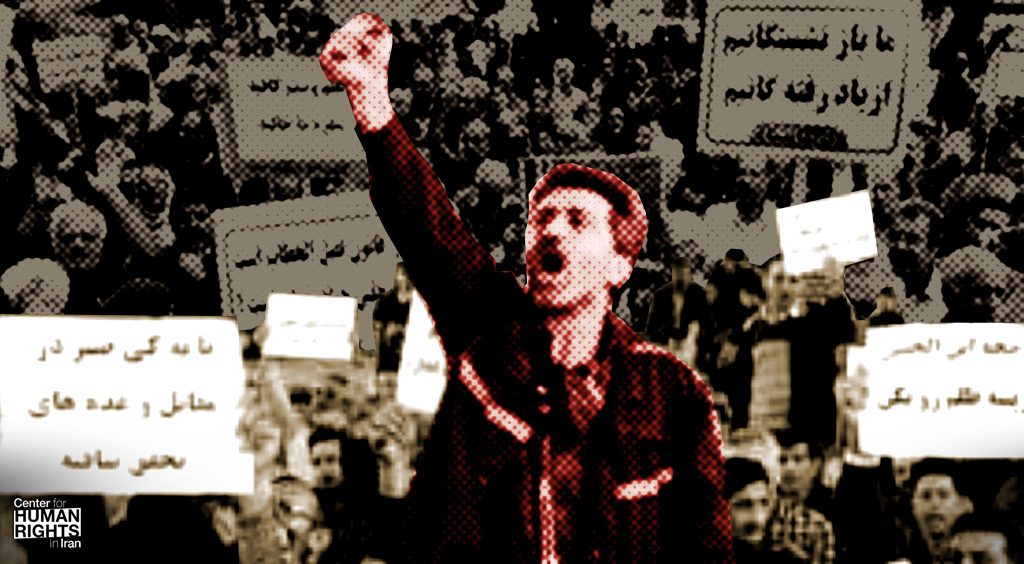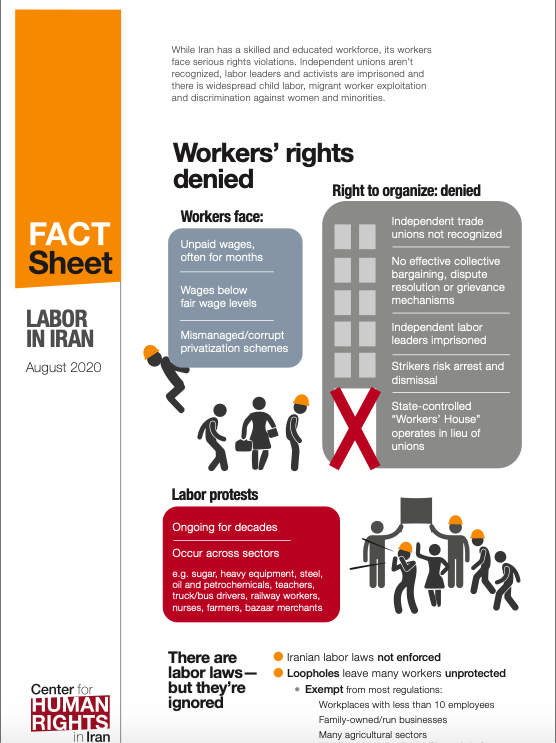Labor Day in Iran: Listen to the People’s Demands for Basic Rights
 Unpaid Wages and Benefits, Unfair Wages Trigger Increasingly Organized Strikes
Unpaid Wages and Benefits, Unfair Wages Trigger Increasingly Organized Strikes
Labor Activists Jailed Under Trumped-Up Charges
April 30, 2021 – As International Labor Day approaches, workers across Iran are facing a deepening crisis and inability to meet their most basic economic needs, as reflected in the growing number of labor protests and strikes this past year. Yet the government has not only failed to provide solutions, it has instead increasingly suppressed peaceful labor activism.
“The Constitution states that the economy was built ‘to uproot poverty and deprivation [and] to fulfill the needs of human beings in the process of growth, while also maintaining liberty’—yet as the labor crisis spreads, security and judicial officials are taking harsher measures to suppress activists campaigning for the rights of workers,” said Hadi Ghaemi, executive director of the Center for Human Rights in Iran (CHRI).
“The government should stop trying to jail and shoot down the people’s demands and instead honor its domestic and international commitments to meet the basic needs of workers and their families,” he added.
According to the International Alliance in Support of Workers in Iran (IASWI), an advocacy group that tracks labor protests in the country, 1,915 protests occurred—mainly by workers, retirees, and teachers—between March 2020 and March 2021, a 50 percent increase compared to the previous year and the highest number in the past seven years, despite the COVID-19 pandemic.
What distinguishes these protests from those in the past is their transformation from sporadic actions to organized demonstrations throughout much of the country.
Despite the government’s decision to raise the minimum wage by 39 percent, workers’ average income does not cover half of their basic expenses. In addition, close to 10 million unofficial workers are receiving less than the minimum wage, according to government data.
Meanwhile, severe economic strains on workers and their families in Iran were cited by individuals who committed suicide in the previous year; suicides increased overall in Iran in 2020.
The persistence and determination of Iranian workers in demanding their rights and rightful wages, combined with their solidarity with retirees, who’ve held numerous rallies in the past year despite the COVID-19 pandemic, demonstrates the urgent need for the Iranian government to address the pressing issues facing workers.
Instead of responding to growing protests, however, the authorities have chosen to suppress workers through harsh judicial actions and violent repression of protests in the name of national security.
CHRI condemns any effort by the Iranian government to prevent or crush labor strikes and protests and holds the authorities directly responsible for the rapidly deteriorating condition of the working class.
According to Article 27 of the Constitution, which states: “Public gatherings and marches are allowed so long as the participants do not carry arms and are not in violation of the fundamental principles of Islam,” workers have the right to hold demonstrations to demand a better living.
Yet independent unions are not recognized in Iran, strikers often lose their jobs and risk arrest, and labor leaders who attempt to organize workers and bargain collectively are prosecuted under national security charges and sentenced to long prison sentences.
The Iranian government has failed to provide solutions for major issues faced by Iran’s 40 million workers including non-payment of back wages, denied healthcare and retirement benefits, employment cuts, and the wide and growing gap between wages and the cost of living.
Although the authorities have increased pressures on the working class and cracked down on activists, protests and strikes are increasingly sprouting throughout the country.
As the labor crisis deepens, more activists are being arrested and tortured to force them to provide false “confessions” on film to ensure they are convicted and slapped with heavy prison sentences.
In the latest crackdown, labor activist Arash Jowhari was sentenced to 16 years in prison in January 2020 on the charges of “organizing unlawful gatherings to disturb security,” (10 years), “assembly and collusion against national security,” (5 years), and propaganda against the state” (one year). If upheld on appeal, he would have to serve 10 years behind bars.
A few months prior, Mehran Raouf, a 64-year-old workers’ rights advocate with British citizenship, was arrested by agents of the Islamic Revolutionary Guard Corps’ Intelligence Organization in October 2020. He has been held in solitary confinement ever since.
“The Iranian government is legally obligated to provide the conditions to meet the basic economic needs of the underprivileged and working classes of society, as well as uphold the right to welfare, retirement benefits, and unemployment and disability insurance,” said Ghaemi.
“Instead, state forces are violently repressing protests and jailing labor leaders in a bid to quash dissent,” he added. “Yet the protests keep reigniting because their flame is the Iranian peoples’ just and urgent calls for basic economic rights.”
Read this article in Persian.







